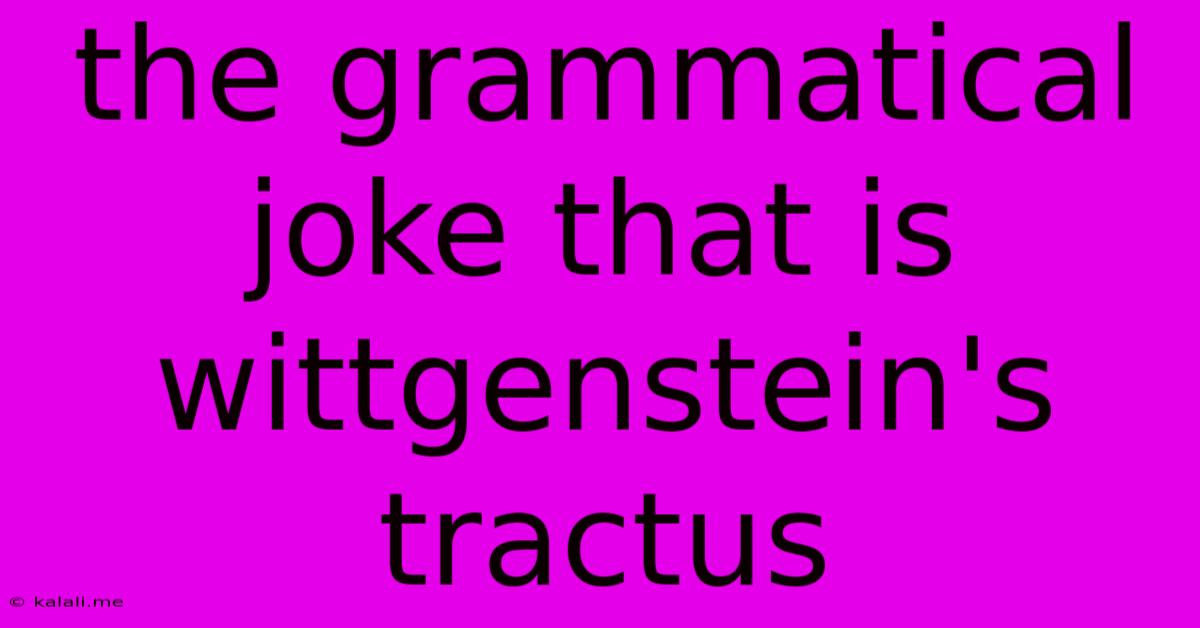The Grammatical Joke That Is Wittgenstein's Tractus
Kalali
May 23, 2025 · 3 min read

Table of Contents
The Grammatical Joke That Is Wittgenstein's Tractatus Logico-Philosophicus
Wittgenstein's Tractatus Logico-Philosophicus, a slim volume brimming with profound pronouncements, is often described as a masterpiece of philosophical conciseness. Yet, its dense, aphoristic style, coupled with its ultimate conclusion – that which can be said can be said clearly, and what cannot be said must be passed over in silence – has sparked endless debate and interpretation. This article delves into the often-overlooked element that contributes significantly to its enigmatic nature: its inherent grammatical joke.
The Tractatus isn't just a philosophical treatise; it's a meticulously constructed linguistic puzzle, a grammatical game cleverly designed to expose the limitations of language itself. Wittgenstein utilizes the very structure and mechanics of language to reveal its inherent traps and paradoxes, ultimately undermining its own pronouncements. This self-referential irony constitutes a sophisticated grammatical joke at the heart of the work.
The Picture Theory and its Limitations
Central to the Tractatus is Wittgenstein's "picture theory" of meaning. He argues that propositions are logical pictures of facts. A proposition mirrors the structure of the reality it describes; its truth or falsehood depends on the correspondence between the proposition's logical structure and the factual state of affairs. This is where the first layer of the "joke" emerges. The theory itself is expressed in language, a tool Wittgenstein later deemed inherently limited in its capacity to represent reality accurately.
The problem? The picture theory, in its attempt to precisely depict the relationship between language and reality, is itself a linguistic construct subject to the same limitations it seeks to describe. The very act of defining how language accurately represents reality uses language itself, creating a self-referential paradox that undermines the theory's foundational assumptions.
The Unsayable and the Showable
Wittgenstein famously claims that what we cannot talk about, we must pass over in silence. This seemingly simple statement belies a deeper layer of the grammatical joke. He argues that ethics, aesthetics, and other transcendental aspects of existence lie beyond the realm of logical analysis and linguistic expression. Yet, by saying this, he implicitly acknowledges the limitations of language while simultaneously using language to point towards something beyond its reach.
The attempt to describe the "unsayable" through language creates a compelling irony. The very act of asserting the inexpressibility of certain concepts relies on the very medium it declares inadequate. This is a grammatical sleight of hand, a subtle linguistic paradox that underlines the limits of symbolic representation.
Logical Atomism and its Internal Contradictions
Wittgenstein's embrace of logical atomism, the belief that the world is composed of simple, independent facts, also contributes to the grammatical joke. The Tractatus attempts to break down complex propositions into their simplest, atomic components to reveal their underlying logical structure. However, this attempt is inherently paradoxical. The process of analysis itself requires language, the very tool that Wittgenstein argues is insufficient for fully capturing reality.
The pursuit of logical atomism becomes a self-defeating exercise, a grammatical game that highlights the impossibility of achieving absolute logical clarity through linguistic means. The work demonstrates the limitations of its own approach through its own methodology.
The Self-Refuting Conclusion
The final proposition of the Tractatus – "Whereof one cannot speak, thereof one must be silent" – is arguably the most significant aspect of the grammatical joke. This proposition, while seemingly definitive, is itself a statement within the very language it seeks to transcend. It's a linguistic move that, by asserting its own limitations, ironically underscores the inherent complexity and self-referentiality of language.
The Tractatus is, in essence, a sophisticated performance of linguistic self-deconstruction. It uses the tools of language to expose its own inability to fully capture reality, ultimately revealing the inherently paradoxical nature of philosophical inquiry itself. It is not simply a philosophical treatise but a carefully crafted grammatical joke that continues to fascinate and challenge readers even a century later.
Latest Posts
Latest Posts
-
Can I Run Admixture With Ped Files
May 23, 2025
-
How To Calculate Eigenvectors From Eigenvalues
May 23, 2025
-
And Nothing Of Value Was Lost
May 23, 2025
-
Do You Need Glasses For Solar Eclipse
May 23, 2025
-
Do You Italicize A Movie Title
May 23, 2025
Related Post
Thank you for visiting our website which covers about The Grammatical Joke That Is Wittgenstein's Tractus . We hope the information provided has been useful to you. Feel free to contact us if you have any questions or need further assistance. See you next time and don't miss to bookmark.